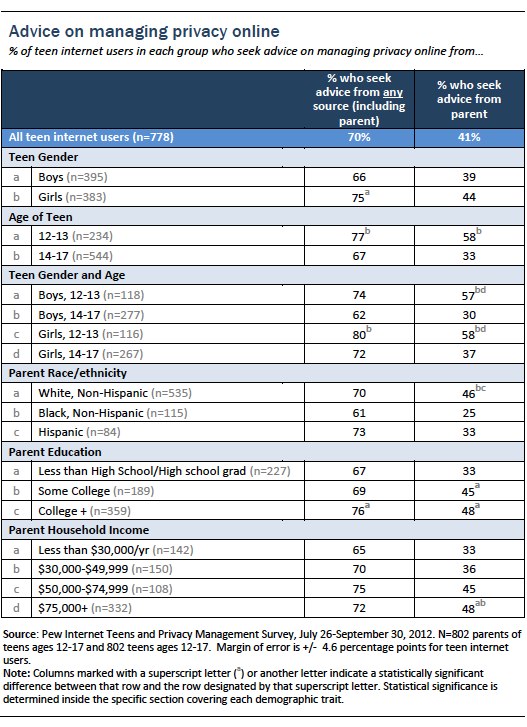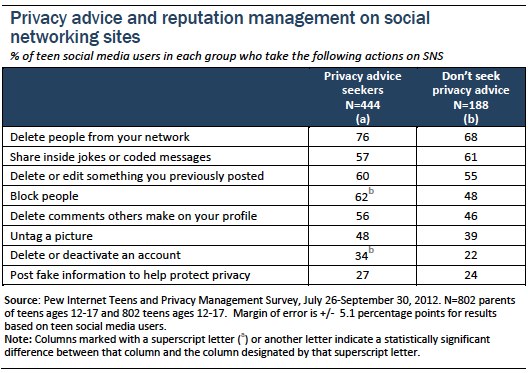American teenagers ages 12 to 17 care about their privacy. Even as youth share increasing amounts of information online (and have information about them shared by others), they also take steps to manage what can be seen and who can access it. This report asks the questions: Who do teens rely on when working their way through the privacy choices that confront them each time they go online? And when they reach a point where they need outside help, where do teens turn for advice about how to manage their privacy online? These questions have great relevance for those who want to understand who or what influences teens as they make choices about what to share and what not to share online.
In order to fully understand how teens are managing their privacy online, this project collected data in two modes – first, through a nationally-representative telephone survey fielded in the summer of 2012, and second, through a series of focus group interviews with adolescents around the country. As our focus groups show, for their day-to-day privacy management, teens generally rely on themselves to figure out the practical aspects of sharing and settings on their own. The bulk of teens are figuring out how to manage their privacy themselves, whether by being walked through their choices by the app or platform when they first sign up, or through search and use of their preferred platform. However, the national survey shows that, at some point, the majority of teens have found themselves in a situation where they needed some outside advice about how to manage their privacy online.
70% of teen internet users have asked for or sought out advice on managing their privacy online. Teens are just as likely to reach out to their friends and peers as they are to reach out to their parents for advice.
When they do seek advice, teens rely on a range of sources for advice about managing their privacy online, with peers and close relatives being—by a substantial margin—the most common sources to which they turn for this type of information. Among teen internet users:
- 42% have asked a friend or peer for advice on managing their privacy online
- 41% have asked a parent
- 37% have asked a sibling or cousin
- 13% have gone to a website for advice1
- 9% have asked a teacher
- 3% have gone to some other person or resource
In total, some 70% of teen internet users have asked for advice or looked for resources on how to manage their privacy online, with the remaining 30% saying that they have not specifically asked for or sought out this type of advice in the past.2
Overall, younger teens (those ages 12-13) are a bit more likely to seek out privacy management advice from any source than are 14-17 year olds (77% of younger teens have done so, compared with 67% of older teens). In looking at the specific people or sources that teens of different ages turn to for this type of advice, younger teens are especially likely to seek out advice from a parent (58% vs. 33%) and from a teacher (17% vs. 5%) compared with their older peers.
Similarly, girls are a bit more likely than boys to seek out advice on managing their privacy online from any source (75% have done so, compared with 66% of boys), and are also more likely to specifically seek out such advice from siblings or cousins (42% vs. 32%) and from friends or other peers (48% vs. 36%).
Although teens of all racial and socio-economic backgrounds are equally likely to seek out or ask for advice on privacy management generally, white teens and those from high-income and high-education households, are particularly likely to turn to their parents for advice.

In focus groups, teens indicate a high level of self-reliance when seeking information on how to manage specific privacy choices and settings online.
While a majority of teens say they have asked someone else for advice about privacy at some point along the way, our focus groups show that in day-to-day use, many teens rely on themselves and the resources provided by the platforms they use.3
Most focus group participants indicate a heavy self-reliance for information about privacy settings on social media, although some seek the advice of others including parents and other adults. They are aware that privacy settings change and it requires some effort to keep up with the changes:
Male (age 13):“The [privacy settings] are straightforward. And I think they [Facebook] change them a lot. And they sort of reset or something. So you just have to constantly, you know, update them.”
Most teens in the focus groups reported teaching themselves about privacy settings online. This “self-learning” is accomplished through trial and error, or, on some platforms such as Facebook, through pop-up messages and tutorials. Although there are myriad strategies for learning about privacy settings, the majority of focus group participants rely on themselves for establishing their privacy settings:
Male (age 16):“I found it myself, just under settings, I looked for it.”
Others followed the instructions provided for choosing privacy settings when creating their social media account.
Interviewer: “So where or when did you learn about Facebook Account Settings and how to use them? Where and when? What do you think?”
Male (age 16): “Probably when you apply, when you’re signing up for it, because there are steps. Step one, you upload your pictures; Step two, you set your settings the way you want them; Step three, you add friends.”
Although there are many resources available for young people to learn how to manage a social networking site’s privacy settings, the majority of focus group participants cited themselves or the site’s Help Page as their primary source of information. Some were very comfortable searching for information about privacy settings online through a search engine like Google, while others said they “just explore” the site. These focus group findings dovetail with the 13% of teens who sought advice from “websites” in the quantitative survey.
A few focus group participants relied on parents or other adults for information about privacy settings. Some had parents who created their privacy settings for them, while other youth asked their parents for advice:
Female (age 14): “Yeah, my mom’s the one who set my privacy for my account.”
Female (age 13): “I would ask probably my parents [if I had a question about privacy settings].”
A few, predominately low-income, focus group participants mentioned teachers as a reliable source of advice about privacy on social media:
Male (age 17): “Teachers could tell you like all these true things about Facebook, how to use Facebook, and how to like have your privacy more private and stuff like that. So probably I would ask like an adult that has more experience and stuff like that. ”
However, when asked a broader question about seeking privacy-related advice, the majority of focus group participants said that if and when they needed it, they would not seek advice from parents, teachers or other adults:
Male (age 18): “Usually I’d just ask a friend. Parents are a no-go… My parents are pretty old school, like, they don’t really use the Internet. And teacher wise, I wouldn’t really want to ask my teachers. Also, I wouldn’t really think that they would know.”
Male (age 16): “Parents, they don’t know how computers work. My dad does, but he doesn’t know how the Internet works…. And teachers, not really. I remember in my old school… We’d had a couple classes about Internet safety, but that was about it. I haven’t asked teachers specific questions about it.”
One focus group participant captured a primary reason that parents, teachers, and other adults are not seen as a go-to resource for information about Internet privacy:
Female (age 16): “I think parents don’t understand that we can apply life skills onto the Internet, whereas it’s a little more confusing, maybe, for them, that switch. But because we’ve grown up with it, we can easily see, OK, stranger in real life, stranger on the computer, same thing.”
Friends and, occasionally, siblings were the secondary source for advice about online privacy for some focus group participants:
Female (age 17): “I’ll try to figure it out myself or just ask friends.”
Female (age 13): “But if it was something that was really, really different, I feel like I would ask that kid at our school who’s really smart with technology.”
Male (age 13): “Probably one of my friends. I don’t really associate my Facebook with my parents or teachers.”
Male (age 16): “Friends really help you figure out how to maneuver websites.”
Male (age 16): “I either learned it on my own, or the couple of questions I’ve had about privacy I’ve asked my sister who’s a junior in college right now.”
However, there are some perceived drawbacks for relying on others for advice about online privacy. Some focus group participants feel that parents expect them to just “figure it out,” while others feel that peers don’t care about or don’t understand privacy well enough and that this can affect the quality of their advice:
Female (age 13): “No, because I feel like they [parents] don’t really care as much and they would just be like, you should figure it out yourself.” Female (age 16): “Yeah, I just kind of figured out, like…my friends don’t particularly care that much.” Male (age 17): “Friends can be telling you other things that is not right and not – it cannot be like – friends can tell you a lot of stuff about Facebook that’s not true.”
With some exceptions, teen “online privacy advice seekers” take similar steps to manage and maintain their online social networking profiles compared with teens who have not sought out privacy advice from others.
For the most part, the 70% of teen internet users who are online privacy advice seekers in the survey are quite similar to those who do not seek out this type of information in terms of their behaviors and actions on social networking sites. The two exceptions: the teens who seek advice are more likely than non-seekers to block other people and to delete or deactivate a profile entirely.

On the other hand, there are no differences between these two groups when it comes to the specific content that they post on their social networking profiles. This is true even for relatively “sensitive” information such as one’s email address, cell phone number, real name, or birth date—teens are equally likely to post this information regardless of whether they have sought out advice from others on how to manage their privacy online.
In terms of the privacy settings on their Facebook profiles, the majority of teens set their profile to either fully or partially private—regardless of whether or not they have sought out advice on how to manage their privacy online. However, online privacy advice seekers are more likely to limit what certain friends can see within their own friend networks, while those who have not sought out privacy advice are a bit more likely to say that all of their friends can see the same content.



